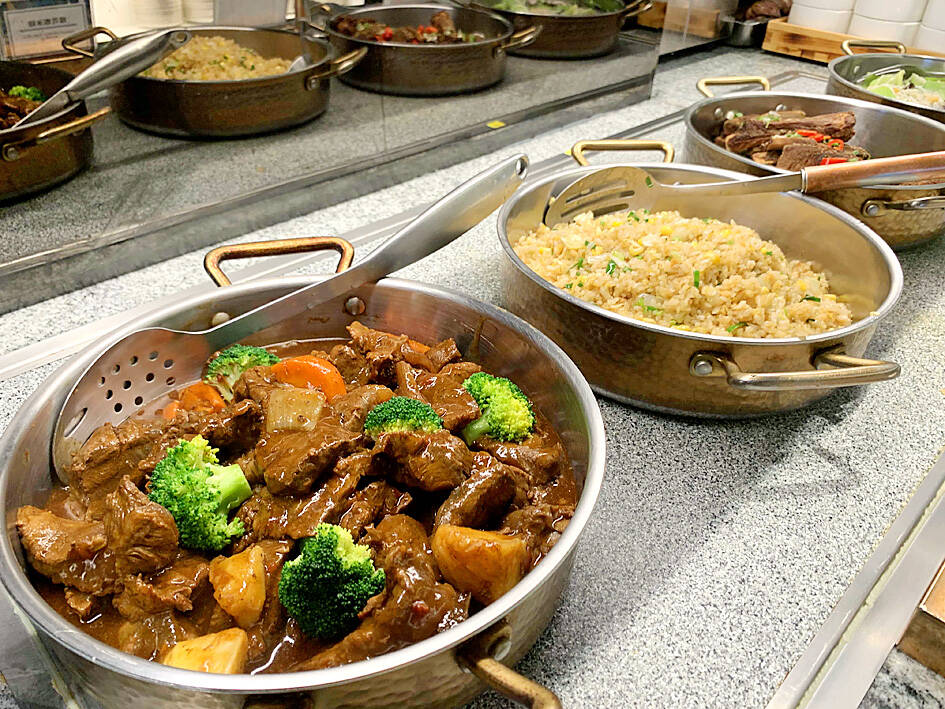The Executive Yuan yesterday approved a proposal to lift a ban on importing Canadian beef from cattle older than 30 months.
The new rules are to take effect immediately, Food and Drug Administration (FDA) Director Wu Shou-mei (吳秀梅) told a news conference.
Taiwan previously only imported Canadian beef from cattle under 30 months old. It lifted similar restrictions on imports of US beef from cattle over the age of 30 months on Jan. 1, 2021.

Photo: Tsai Shu-yuan, Taipei Times
Due to the relatively long incubation period of mad cow disease, cows aged under 30 months are generally thought to be at lower risk of having the disease.
The FDA on April 27 issued a notice on lifting the ban and commenced a 30-day public comment period before the Cabinet approved the proposal.
However, Taiwan will still ban specific risk materials for Canadian beef imports, including the brain, eyes and spinal cord, among other parts, Wu added.
After the ban is lifted, Taiwan would randomly select batches of imports for inspection at a rate of 2 to 10 percent, she said.
Imported products that fail an inspection would be destroyed or returned, and if the number of violations becomes concerning, such imports would be subject to “enhanced random inspections” or “batch-by-batch checks,” Wu added.
Currently, 55 countries, including the US, the UK and Japan, allow imports of Canadian beef, Cabinet spokesman Lin Tze-luen (林子倫) told the news conference.
The move to allow imports of Canadian beef from cattle over the age of 30 months came after a government source said that the ban could be a major stumbling block between Ottawa and Taipei, as they negotiate a deal to encourage two-way investment, called the Foreign Investment Promotion and Protection Agreement.
The source said progress on reaching a deal was going “very smoothly” until negotiations turned to the 30-month slaughter-age limit.
The source added that the government was hopeful that Canada would support Taiwan’s accession to the Comprehensive and Progressive Agreement for Trans-Pacific Partnership (CPTPP).
The Consumers’ Foundation in a news release yesterday called for a boycott of Canadian beef, saying the North American nation’s last reported case of mad cow disease was fairly recent and it has not clarified feed contamination concerns.
When Ottawa reported a case of mad cow disease in December 2021, South Korea, China and the Philippines stopped importing Canadian beef, it said, opposing the government’s decision to open imports.

‘DENIAL DEFENSE’: The US would increase its military presence with uncrewed ships, and submarines, while boosting defense in the Indo-Pacific, a Pete Hegseth memo said The US is reorienting its military strategy to focus primarily on deterring a potential Chinese invasion of Taiwan, a memo signed by US Secretary of Defense Pete Hegseth showed. The memo also called on Taiwan to increase its defense spending. The document, known as the “Interim National Defense Strategic Guidance,” was distributed this month and detailed the national defense plans of US President Donald Trump’s administration, an article in the Washington Post said on Saturday. It outlines how the US can prepare for a potential war with China and defend itself from threats in the “near abroad,” including Greenland and the Panama

The High Prosecutors’ Office yesterday withdrew an appeal against the acquittal of a former bank manager 22 years after his death, marking Taiwan’s first instance of prosecutors rendering posthumous justice to a wrongfully convicted defendant. Chu Ching-en (諸慶恩) — formerly a manager at the Taipei branch of BNP Paribas — was in 1999 accused by Weng Mao-chung (翁茂鍾), then-president of Chia Her Industrial Co, of forging a request for a fixed deposit of US$10 million by I-Hwa Industrial Co, a subsidiary of Chia Her, which was used as collateral. Chu was ruled not guilty in the first trial, but was found guilty

A wild live dugong was found in Taiwan for the first time in 88 years, after it was accidentally caught by a fisher’s net on Tuesday in Yilan County’s Fenniaolin (粉鳥林). This is the first sighting of the species in Taiwan since 1937, having already been considered “extinct” in the country and considered as “vulnerable” by the International Union for Conservation of Nature. A fisher surnamed Chen (陳) went to Fenniaolin to collect the fish in his netting, but instead caught a 3m long, 500kg dugong. The fisher released the animal back into the wild, not realizing it was an endangered species at

DEADLOCK: As the commission is unable to forum a quorum to review license renewal applications, the channel operators are not at fault and can air past their license date The National Communications Commission (NCC) yesterday said that the Public Television Service (PTS) and 36 other television and radio broadcasters could continue airing, despite the commission’s inability to meet a quorum to review their license renewal applications. The licenses of PTS and the other channels are set to expire between this month and June. The National Communications Commission Organization Act (國家通訊傳播委員會組織法) stipulates that the commission must meet the mandated quorum of four to hold a valid meeting. The seven-member commission currently has only three commissioners. “We have informed the channel operators of the progress we have made in reviewing their license renewal applications, and